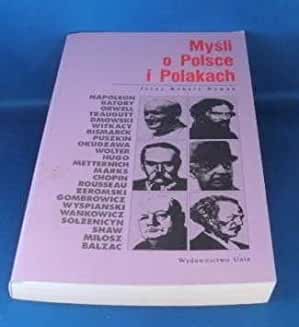Leading Polonophiles and Polonophobes: A Who’s Who Nowak

Mysli o Polsce, by Jerzy Robert Nowak. 1994
A Brief Survey of Prominent Polonophiles and Polonophobes in History. Gerald Green’s 1978 Television Series HOLOCAUST Taken to Task For Its Grotesque Polonophobia
This mini-encyclopedia (titled: THOUGHTS ABOUT POLAND AND POLES) surveys many thinkers and their statements about Poles and Poland. The debates between friends and foes of Poland became especially pronounced at critical junctures of her history: The Partitions and ensuing efforts to recover Polish independence, WWI and the resurrection of the Polish state, WWII and the betrayal of Poland in the events up to and including Teheran and Yalta, and, finally, the increasing postwar drift towards a largely Judeocentric remembrance of WWII.
SOME HISTORIC POLONOPHILES
Notable Polonophiles include Erasmus, Rousseau, Napoleon, German composer Richard Wagner, Victor Hugo, Garibaldi, Lafayette, Herzen, Tolstoy, US President Woodrow Wilson, George Orwell (Eric Blair), and Alexander Solzhenitsyn. American auto manufacturer Henry Ford had this opinion of Polish workers: “Out of all foreigners, Polish workers are the most competent.” (p. 221). The German philosopher Friedrich Wilhelm Nietzsche was of recent Polish descent–the noble Nicki family. Nietzsche reported that, as a boy, he was already proud of his Polish heritage. He even said: “I consider Poles the bravest and most successful of the Slavic nations, and Slavs as a whole as above the Germans. I even think that it was the admixture of Slavic blood that enabled the Germans to join the ranks of achieving nations.” (p. 172). (Ironically, his views in this regard are the exact opposite of the Nazis, who always contended that all Slavic culture is copied German culture, and that all successful individuals in Slavic countries are self-evidently of German descent.). Nietzsche went as far as reckoning “Polish liabilities” such as political individualism, and a tendency for escapades, to be hidden assets. Jewish Polonophiles, discussed by Nowak, include the 16th-century rabbi Moses Isserles, American Jewish writer Howard Fast, and Joseph Lichten. Isserles praised Polish tolerance. Howard Fast added: “Only thanks to Poland, during her period of national might, did thousands of Jews manage to flee medieval Germany and all her sicknesses of soul. (In Poland) they managed to blossom into a population of millions of Ashkenazi Jews, who now constitute the majority of Jews in the United States, the Soviet Union, and Israel.” (p. 318). Holocaust-survivor Joseph Lichten took Gerald Green strongly to task for his transparent and absurd anti-Polish slant in the film series HOLOCAUST, which had been viewed by 120 million Americans in 1978. (pp. 319-320).
POLAND THE RECIPIENT OF NEVER-ENDING LIES
During the sellout of Poland at the time of Teheran, Labour Party member Patrick J. Dollan chided the British leadership for appeasing the Soviets, and said: “No other nation has been beset with falsehoods as much as Poland…why are falsehoods tolerated in our nation?…To which nation did the Premier turn for help after the fall of France in 1940? To Poland, to General Sikorski, and to Poles. There was no one else who was willing to help us in our time of difficulty…” (p. 259).
SOME HISTORIC POLONOPHOBES
The ranks of Polonophobes include Clausewitz, Frederick II Hohenzollern, Catherine the [not] Great, Voltaire, Pushkin, Engels, Bismarck, Rosa Luxemburg, Lenin, Lloyd George, George Curzon, Maynard Keynes, Herbert George Wells, Leon Uris, Gerald Green, and Menachem Begin. [This list could be greatly expanded and updated]. US President Franklin Roosevelt drifted from Polonophilia to Polonophobia, eventually adopting a Pole-blaming attitude: “Poland has been a source of troubles for the last 500 years.” (p. 250). Considering his disgraceful sellout of Poland at Yalta, I find his blame-the-victim approach quite entertaining.
To see a series of truncated reviews in a Category click on that Category:
- All reviews
- Anti-Christian Tendencies
- Anti-Polish Trends
- Censorship on Poles and Jews
- Communization of Poland
- Cultural Marxism
- German Guilt Dilution
- Holocaust Industry
- Interwar Polish-Jewish Relations
- Jewish Collaboration
- Jewish Economic Dominance
- Jews Antagonize Poland
- Jews Not Faultless
- Jews' Holocaust Dominates
- Jews' Holocaust Non-Special
- Nazi Crimes and Communist Crimes Were Equal
- Opinion-Forming Anti-Polonism
- Pogrom Mongering
- Poland in World War II
- Polish Jew-Rescue Ingratitude
- Polish Nationalism
- Polish Non-Complicity
- Polish-Ukrainian Relations
- Polokaust
- Premodern Poland
- Recent Polish-Jewish Relations
- The Decadent West
- The Jew as Other
- Understanding Nazi Germany
- Why Jews a "Problem"
- Zydokomuna